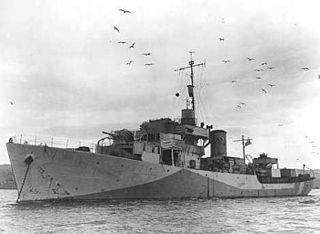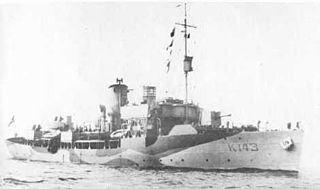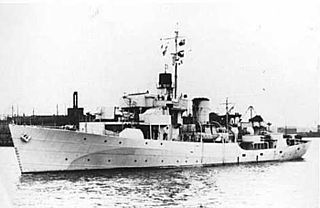Related Research Articles

HMCS Buctouche was a Flower-class corvette that served in the Royal Canadian Navy (RCN) during the Second World War. She served primarily in the Battle of the Atlantic as a convoy escort. She was named for Bouctouche, New Brunswick.

The Flower-class corvette was a British class of 294 corvettes used during World War II, specifically with the Allied navies as anti-submarine convoy escorts during the Battle of the Atlantic. Royal Navy ships of this class were named after flowers, hence the name of the class.

The River class was a class of 151 frigates launched between 1941 and 1944 for use as anti-submarine convoy escorts in the North Atlantic. The majority served with the Royal Navy (RN) and Royal Canadian Navy (RCN), with some serving in the other Allied navies: the Royal Australian Navy (RAN), the Free French Navy (FFN), the Royal Netherlands Navy and, post-war, the South African Navy (SAN).

HMCS Snowberry was a Flower-class corvette that was originally built for the Royal Navy, but spent most of the war in service with the Royal Canadian Navy. She fought primarily as a convoy escort during the Second World War. She served primarily in the Battle of the Atlantic.
Several Canadian naval units have been named HMCS Ville de Quebec.
Several units of the Royal Canadian Navy have been named HMCS Kitchener.

HMCS Kitchener was a Royal Canadian Navy revised Flower-class corvette which took part in convoy escort duties during the Second World War. She fought primarily in the Battle of the Atlantic. She was named for Kitchener, Ontario. The vessel was originally named HMCS Vancouver but was renamed in November 1941 before the ship was launched.

HMCS Long Branch was a modified Flower-class corvette that served in the Royal Canadian Navy during the Second World War. She was used primarily as a convoy escort in the Battle of the Atlantic. She was laid down as HMS Candytuft but was transferred to the RCN on 5 January 1944 before completion. She was named for Long Branch, Ontario, a village that was eventually amalgamated into Toronto, Ontario.
At least three ships of the Royal Navy have been named HMS Candytuft :

HMCS Dawson was a Flower-class corvette that served in the Royal Canadian Navy (RCN) during the Second World War. She was one of the few Canadian corvettes to serve in action in both oceans. She was named for Dawson City, Yukon.

HMCS Fredericton was a Flower-class corvette of the Royal Canadian Navy. She was ordered from Marine Industries Ltd. in Sorel, Quebec and laid down on 22 March 1941. She was launched on 2 September 1941 and commissioned on 8 December 1941. She was named after the community of Fredericton, New Brunswick.

HMCS Timmins was a Flower-class corvette of the Royal Canadian Navy that served during the battle of the Atlantic from 1942 to 1945. She was ordered from Yarrows Ltd. in Esquimalt, British Columbia and laid down on 14 December 1940. She was launched on 26 June 1941 and commissioned on 10 February 1942. She was named after the community of Timmins, Ontario.

HMCS Fennel was a Flower-class corvette that served primarily with the Royal Canadian Navy during the Second World War. Originally commissioned into the Royal Navy, she served as an ocean escort in the Battle of the Atlantic.

HMCS Louisburg was a Flower-class corvette that served with the Royal Canadian Navy during the Second World War. She fought mainly as an ocean escort during the Battle of the Atlantic. She was sunk in 1943. She was named for Louisburg, Nova Scotia.

HMCS Lunenburg was a Flower-class corvette that served with the Royal Canadian Navy during the Second World War. She fought primarily in the Battle of the Atlantic as an ocean escort. She was named for Lunenburg, Nova Scotia.

HMCS Trail was a Flower-class corvette that served with the Royal Canadian Navy during the Second World War. She served primarily in the Battle of the Atlantic as a convoy escort. She was named for Trail, British Columbia.

HMCS Vancouver was a Flower-class corvette that served with the Royal Canadian Navy during the Second World War. She saw action primarily in both Atlantic and Pacific theatres. She was named for Vancouver, British Columbia. She was the second commissioned ship and the third overall to bear the name Vancouver.

HMCS Forest Hill was a modified Flower-class corvette that served with the Royal Canadian Navy during the Second World War. She served primarily as a convoy escort in the Battle of the Atlantic. She was originally laid down by the Royal Navy as HMS Ceanothos but was never commissioned into the RN, being transferred to the RCN before completion. She is named for Forest Hill, Ontario, a town that was eventually amalgamated into the larger city Toronto, Ontario.

HMCS Giffard was a modified Flower-class corvette that served with the Royal Canadian Navy during the Second World War. She served primarily as a convoy escort in the Battle of the Atlantic. She was originally laid down by the British Royal Navy as HMS Buddleia but was never commissioned into the former, being transferred to the Royal Canadian Navy before completion. She is named for Giffard, Quebec, which at the time was a small village, but was eventually amalgamated into first, Beauport Quebec and then finally, Quebec City.

HMCS Mimico was a modified Flower-class corvette that served with the Royal Canadian Navy during the Second World War. She served primarily as a convoy escort in the Battle of the Atlantic. She was originally laid down by the Royal Navy as HMS Bullrush but was never commissioned into the RN, being transferred to the RCN before completion. She is named for Mimico, Ontario, a town that was eventually amalgamated into the larger city Toronto, Ontario.
References
- Citations
- ↑ Johnston et al., p.1009
- References
- Colledge, J. J.; Warlow, Ben (2006) [1969]. Ships of the Royal Navy: The Complete Record of all Fighting Ships of the Royal Navy (Rev. ed.). London: Chatham Publishing. ISBN 978-1-86176-281-8.
- Johnston, William; Rawling, William G.P; Gimblett, Richard; and MacFarlane, John. (2010) The Seabound Coast: The Official History of the Royal Canadian Navy, 1867-1939. Volume 1; Toronto: Dundurn Press. ISBN 978-1-55488-908-2